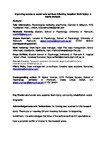Improving access to social care services following Acquired Brain Injury: A needs analysis.
| dc.contributor.author | Odumuyiwa, T | |
| dc.contributor.author | Kennedy, M | |
| dc.contributor.author | Norman, Alyson | |
| dc.contributor.author | Holloway, M | |
| dc.contributor.author | Freya, S | |
| dc.contributor.author | Hannah, F | |
| dc.contributor.author | Hilary, D | |
| dc.date.accessioned | 2019-07-11T09:45:53Z | |
| dc.date.issued | 2019-11-18 | |
| dc.identifier.issn | 2516-9122 | |
| dc.identifier.issn | 2516-9122 | |
| dc.identifier.uri | http://hdl.handle.net/10026.1/14627 | |
| dc.description.abstract |
Context: Survivors of acquired brain injury (ABI) experience long-term cognitive, behavioural, psychological and social consequences often overlooked by health and social care providers, as are the implications for family members. Objective: To improve understanding of 1) the long-term community rehabilitation needs of ABI survivors and their families, and 2) their experiences of community health and social care provision within the United Kingdom. Method: A mixed-method, predominantly qualitative, approach was employed using questionnaires and semi-structured interviews in a two-stage design. Stage one: Seventy-six participants (31 ABI specialist professionals, 26 family members and 19 survivors) completed an online survey analysed using conventional content analysis. Participants were invited to take part in stage two, which recruited 21 participants (12 ABI survivors, 5 family members and 4 professionals) to semi-structured interviews analysed using a mixed thematic approach. Findings: Three main themes were identified with associated sub-themes 1) consequences of ABI ( cognitive and behavioural; psychological and social consequences, impact on family) 2) types of services required (tailored, specialist and interdisciplinary care) and 3) poor access to services (associated with; lack of understanding of ABI among professionals, the hidden nature of ABI, organisational structures and a lack of available services). Limitations: The study failed to achieve a sample distributed evenly across the United Kingdom, making it difficult to draw conclusions around best practice. Implications: The study concluded that professionals need training to understand the needs of ABI survivors and their families and that services need to be provided in a long-term, integrated manner. | |
| dc.format.extent | 164-164 | |
| dc.language.iso | en | |
| dc.publisher | LSE Press | |
| dc.subject | 3 Good Health and Well Being | |
| dc.title | Improving access to social care services following Acquired Brain Injury: A needs analysis. | |
| dc.type | journal-article | |
| plymouth.issue | 2019 | |
| plymouth.volume | 0 | |
| plymouth.publication-status | Published online | |
| plymouth.journal | Journal of Long term care | |
| dc.identifier.doi | 10.31389/jltc.6 | |
| plymouth.organisational-group | /Plymouth | |
| plymouth.organisational-group | /Plymouth/Faculty of Health | |
| plymouth.organisational-group | /Plymouth/Faculty of Health/School of Psychology | |
| plymouth.organisational-group | /Plymouth/REF 2021 Researchers by UoA | |
| plymouth.organisational-group | /Plymouth/REF 2021 Researchers by UoA/UoA04 Psychology, Psychiatry and Neuroscience | |
| plymouth.organisational-group | /Plymouth/Research Groups | |
| plymouth.organisational-group | /Plymouth/Research Groups/Centre for Brain, Cognition and Behaviour (CBCB) | |
| plymouth.organisational-group | /Plymouth/Research Groups/Centre for Brain, Cognition and Behaviour (CBCB)/Behaviour | |
| plymouth.organisational-group | /Plymouth/Users by role | |
| plymouth.organisational-group | /Plymouth/Users by role/Academics | |
| dcterms.dateAccepted | 2019-07-09 | |
| dc.rights.embargodate | 2019-12-13 | |
| dc.identifier.eissn | 2516-9122 | |
| dc.rights.embargoperiod | Not known | |
| rioxxterms.versionofrecord | 10.31389/jltc.6 | |
| rioxxterms.licenseref.uri | http://www.rioxx.net/licenses/all-rights-reserved | |
| rioxxterms.licenseref.startdate | 2019-11-18 | |
| rioxxterms.type | Journal Article/Review |


